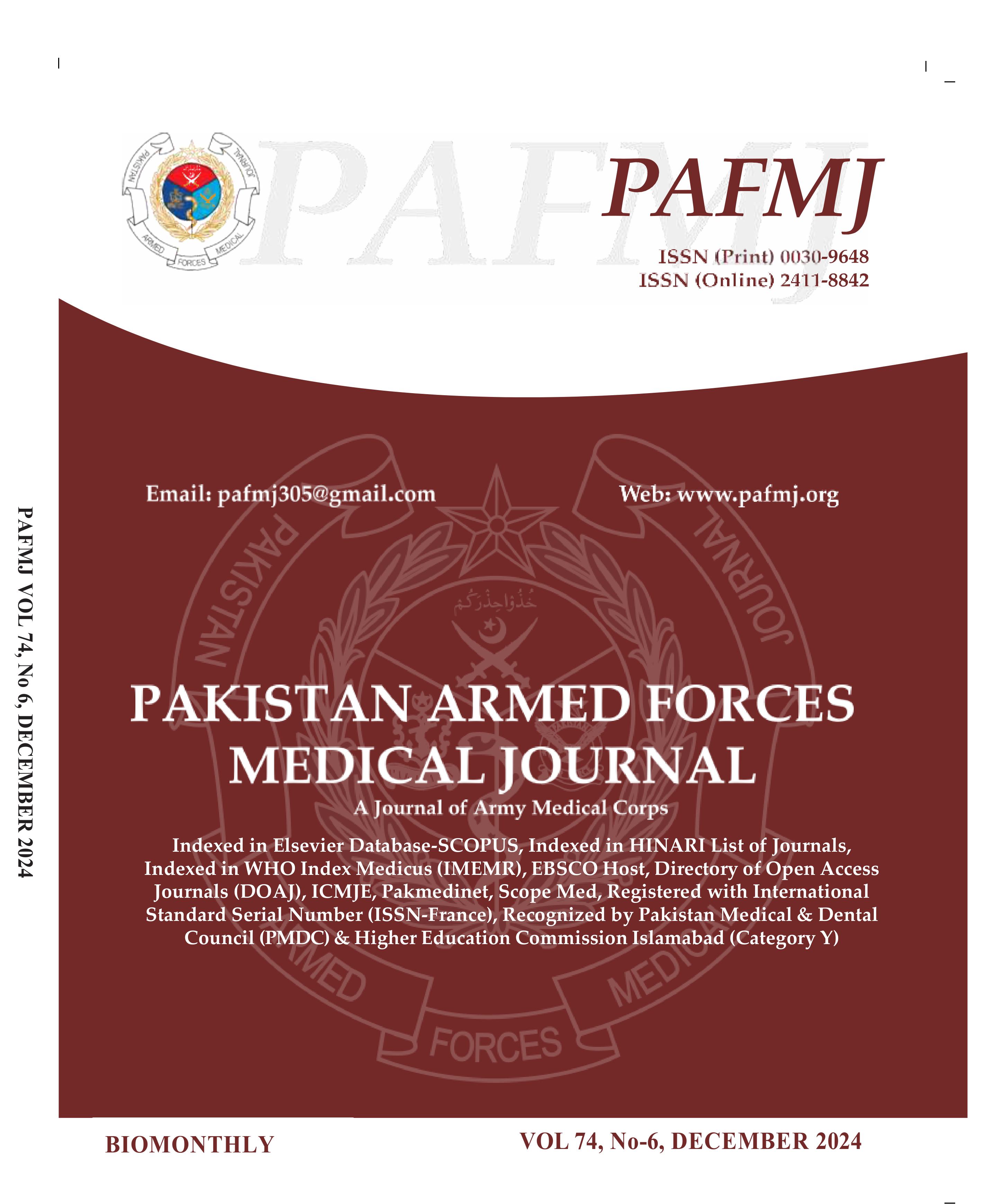Post-Operative Wound Infection after Elective Abdominal Surgery in Diabetic Patients with Good Glycemic Control Versus Patients with no Diabetes; A Comparative Study
DOI:
https://doi.org/10.51253/pafmj.v74i6.9999Keywords:
Abdominal Surgery in Diabetes, Post Operative Infection, Wound Infection in Diabetes.Abstract
Objective: To compare the frequency of post-operative wound infection after elective abdominal surgery in controlled diabetes mellitus patients versus patients without diabetes of same age.
Study design: Quasi-experimental study.
Place and duration of study: Combined Military Hospital Rawalpindi, Pakistan from Apr to Dec 2022.
Methodology: The quasi experimental study was conducted on 60 patients [30 with well controlled diabetes (group-A) and 30 without diabetes (group-B)]. The patients aged between 18 to 65 years of either gender, scheduled to have elective abdominal surgery were included in the study. Patients in both the groups were followed up four weeks after surgery to see the presence of post-operative wound infection.
Results: Out of the 60 patients (30 with well controlled diabetes and 30 without diabetes) included in the study the mean age of patients was 34.43±8.49 years. Male patients were 40(66.70%) while remaining 20(33.30%) patients were females. There was no statistically significant difference between the two groups in terms of baseline characteristics except for baseline HbA1C% levels (p< 0.001). Frequency of post-operative wound infection was significantly higher in group-A [15(50.00%)] as compared to group-B [5(16.67%)], p=0.006.
Conclusion: The frequency of developing post operative surgical site infection in patients with diabetes having good glycemic control is higher as compared to non-diabetic patients. Post-operative wound infection is a common complication after surgery. Presence of diabetes, even if well controlled increases the chances of developing post-operative wound infection.
Downloads
References
Basunbul LI, Alhazmi LSS, Almughamisi SA, Aljuaid NM, Rizk H, Moshref R. Recent technical developments in the field of laparoscopic surgery: a literature review. Cureus 2022; 14(2): e22246. http://.doi.org/10.7759/cureus.22246
Jaschinski T, Mosch CG, Eikermann M, Neugebauer EA, Sauerland S. Laparoscopic versus open surgery for suspected appendicitis. Cochrane Database Syst Rev 2018; 11(11): CD001546. https://doi.org/10.1002/14651858.cd001546.pub4
Buia A, Stockhausen F, Hanisch E. Laparoscopic surgery: A qualified systematic review. World J Methodol 2015; 5(4): 238-254. https://doi.org/10.5662/wjm.v5.i4.238
Alkaaki A, Al-Radi OO, Khoja A, Alnawawi A, Alnawawi A, Maghrabi A, et al. Surgical site infection following abdominal surgery: a prospective cohort study. Can J Surg 2019; 62(2): 111-117. https://doi.org/10.1503/cjs.004818
LegesseLaloto T, HikoGemeda D, Abdella SH. Incidence and predictors of surgical site infection in Ethiopia: prospective cohort. BMC Infect Dis 2017 3; 17(1): 119.
https://doi.org/10.1186/s12879-016-2167-x
Maqsood R, Ans M, Malhi AA, Mahmood K, Afzal H, Zulfiqar U. Wound complications due to diabetes in patients undergoing abdominal surgery. Pak Armed Forces Med J 2020; 70(1): 3-7.
Tayyab AS, Qurban M, Mazhar M, Tayyab Z, Tahir M, Tayyab Z. Frequency and risk factors of wound complications in type II patients with diabetes undergoing abdominal surgery. J Pharm Res Int 2021; 33(59A): 591-595.
https://doi.org/10.9734/jpri/2021/v33i59A34308
Casqueiro J, Casqueiro J, Alves C. Infections in patients with diabetes mellitus: A review of pathogenesis. Indian J Endocrinol Metab 2012; 16(Suppl1): S27-36.
https://doi.org/10.4103/2230-8210.94253
Martin ET, Kaye KS, Knott C, Nguyen H, Santarossa M, Evans R, et al. Diabetes and risk of surgical site infection: A systematic review and meta-analysis. Infect Control Hosp Epidemiol 2016; 37(1): 88-99. https://doi.org/10.1017/ice.2015.249
Werner BC, Teran VA, Cancienne J, Deal DN. The association of perioperative glycemic control with postoperative surgical site infection following open carpal tunnel release in patients with diabetes. Hand 2019; 14(3): 324-328.
https://doi.org/10.1177/1558944717743594
Sattar F, Sattar Z, Zaman M, Akbar S. Frequency of post-operative surgical site infections in a tertiary care hospital in Abbottabad, Pakistan. Cureus 2019; 11(3): e4243
https://doi.org/10.7759/cureus.4243
American Diabetes Association Professional Practice Committee. 6. Glycemic targets: Standards of medical care in diabetes-2022. Diabetes Care 2022; 45(Suppl 1): S83-S96
https://doi.org/10.2337/dc22-s006
American Diabetes Association Professional Practice Committee. 2. Classification and diagnosis of diabetes: Standards of medical care in diabetes-2022. Diabetes Care 2022; 45(Suppl1): S17-S38 https://doi.org/10.2337/dc22-s002
Zabaglo M, Sharman T. Postoperative wound infection. In: StatPearls. Treasure Island (FL): StatPearls Publishing; 2022.
Mishra P, Pandey CM, Singh U, Gupta A, Sahu C, Keshri A. Descriptive statistics and normality tests for statistical data. Ann Card Anaesth 2019; 22(1): 67-72
https://doi.org/10.4103/aca.aca_157_18
Ismat U, Khan A, Nawaz A, Mansoor R, Malik AA, Sher F, et al. Surgical site infection in diabetic and non-diabetic patients undergoing laparoscopic cholecystectomy. J Coll Physicians Surg Pak 2016; 26(2): 100-102.
Al-Mulhim AR. The outcome of laparoscopic cholecystectomy in diabetic patients: a prospective study. J Laparoendosc Adv Surg Tech 2010; 20(5): 417-420.
https://doi.org/10.1089/lap.2009.0436
Chuang SC, Lee KT, Chang WT, Wang SN, Kuo KK, Chen JS, et al. Risk factors for wound infection after cholecystectomy. J Formos Med Assoc 2004; 103(8): 607-612.
Mangrulkar S, Khair PS. Comparison of healing of surgical wounds between diabetics and non-diabetics. J Indian Med Assoc 2009; 107(11): 765-770.
Rafiq MK, Sultan B, Kamran H, Khan YA, Wadud F, Aziz Y. Frequency and risk factors of wound complications after abdominal surgery in diabetic patients. Rawal Med J 2021; 46(1): 68-71.
Butler SO, Btaiche IF, Alaniz C. Relationship between hyperglycemia and infection in critically ill patients. Pharmacotherapy 2005; 25(7): 963-976.
Downloads
Published
Issue
Section
License
Copyright (c) 2024 Muhammad Shahzad, Bilal Saeed, Hammad Qayyum , Waqas Farooq , Shakeel Ahmed , Basit Ali Cheema

This work is licensed under a Creative Commons Attribution-NonCommercial 4.0 International License.















